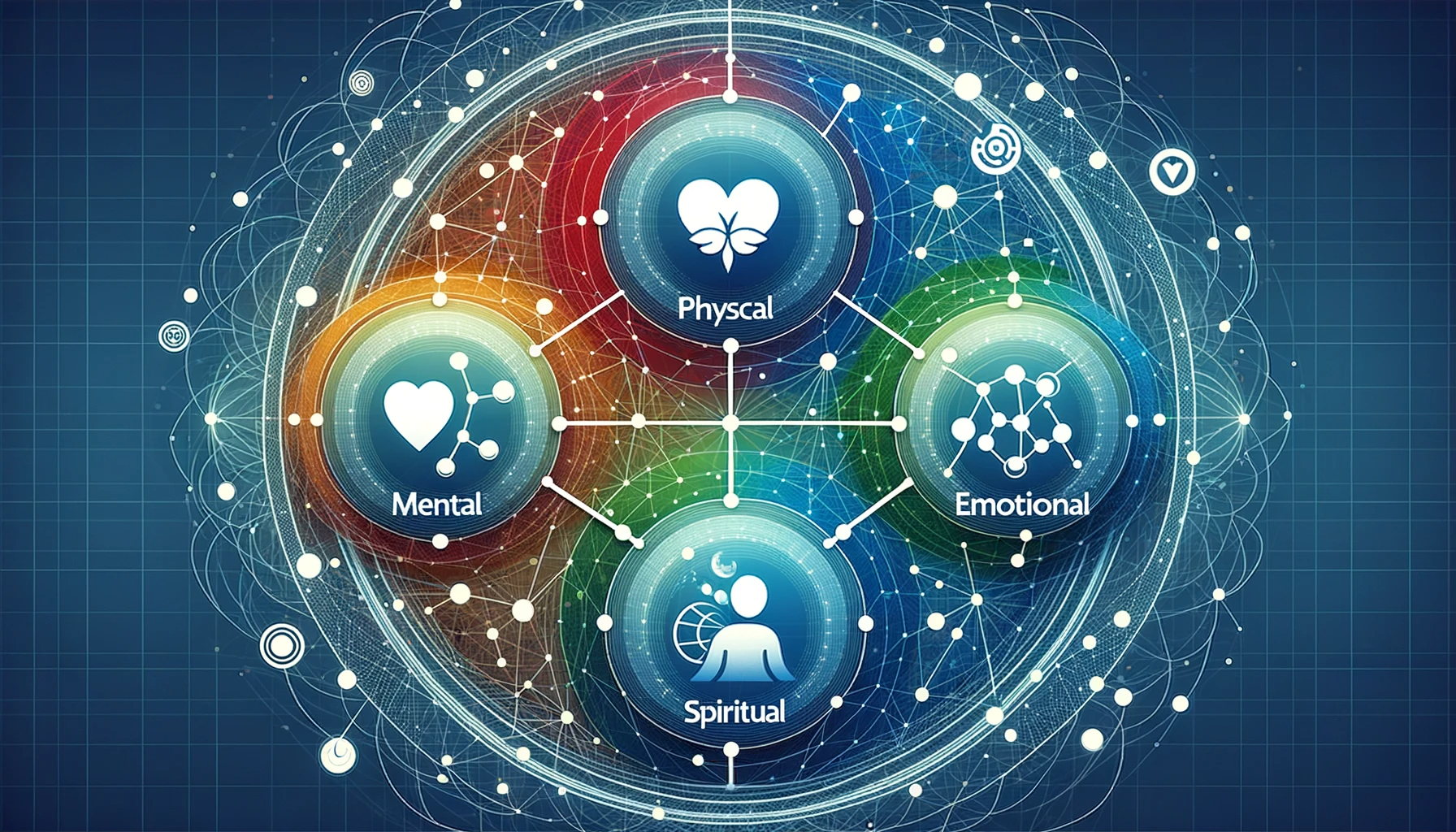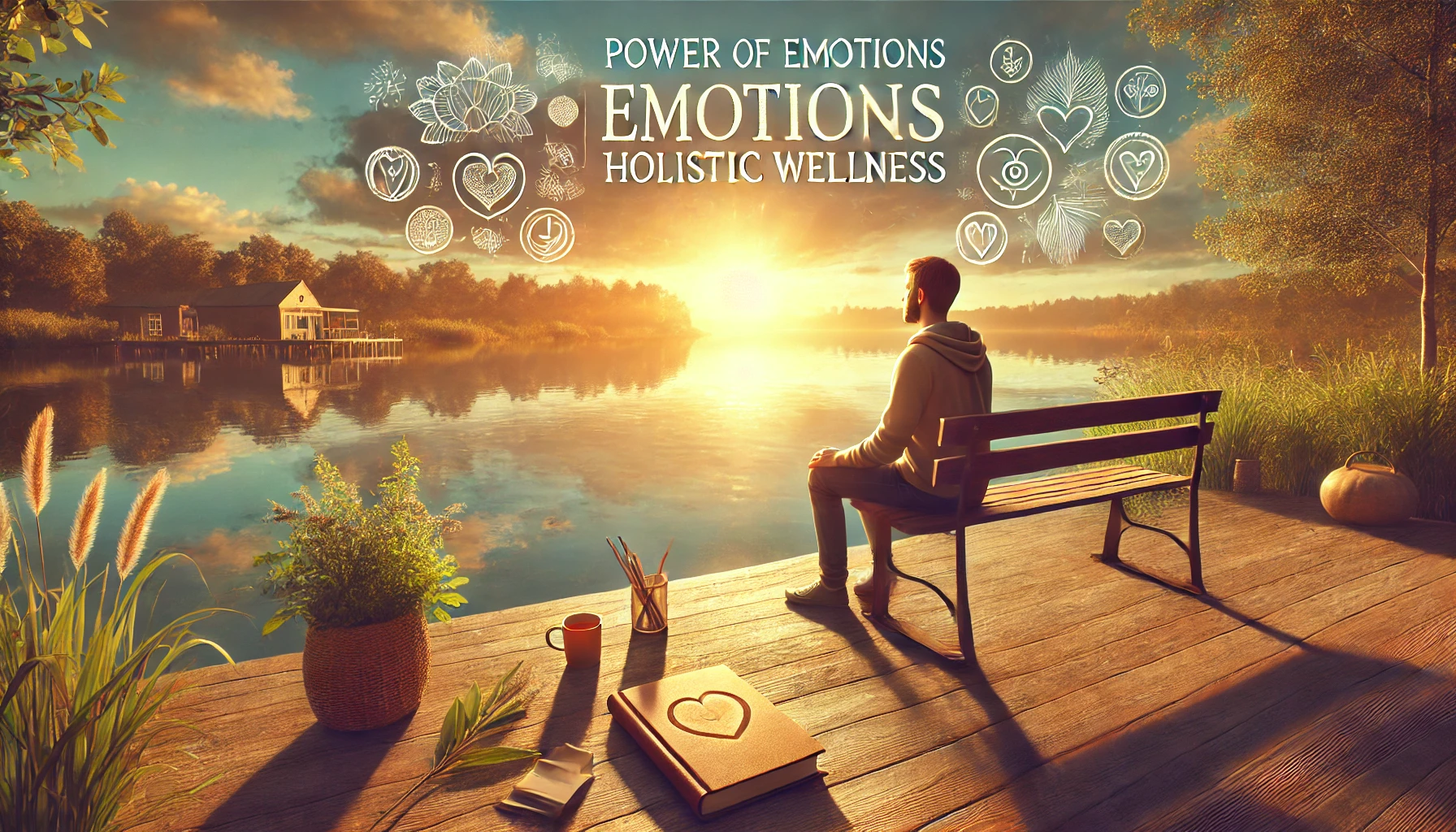Beginner's Guide to Holistic Health: Your Path to Total Wellness

Beginner's Guide to Holistic Health
Embark on a wellness journey with our beginner's guide to holistic health. This comprehensive guide will introduce you to the foundations of holistic well-being, including physical, mental, emotional, and spiritual health. Understanding these aspects and their interconnectedness allows you to begin your wellness journey confidently and clearly.
Holistic health is about taking a whole-person approach to well-being. It recognizes that each aspect of health is interconnected and influences the others. When one area is out of balance, it can affect overall wellness. That's why it's essential to address all dimensions of health for optimal well-being.
Wellness Journey Basics
As a beginner in holistic health, it's essential to start by exploring the basics. This introductory guide will provide a solid foundation for your wellness journey. You'll learn about the importance of physical activity, balanced nutrition, and the mind-body connection.
Physical activity plays a crucial role in holistic health. Regular exercise improves physical fitness and enhances mental well-being and emotional resilience. It boosts energy levels, reduces stress, and promotes better sleep. Whether walking, jogging, dancing, or practicing yoga, finding an activity you enjoy will make it easier to incorporate into your daily routine.
Balanced nutrition is another crucial component of holistic wellness. Nourishing your body with wholesome foods provides essential nutrients that support overall health. A diet rich in fruits, vegetables, whole grains, lean proteins, and healthy fats can improve energy levels and promote optimal bodily system functioning.
The mind-body connection is the intricate relationship between our thoughts, emotions, and physical well-being. Our mental state can significantly impact our physical health and vice versa. We can enhance our psychological and physical well-being by cultivating positive thoughts and managing stress effectively through meditation or mindfulness exercises.
Introductory Guide to Holistic Health
This introductory guide aims to provide you with an understanding of holistic health principles so that you can embark on a path towards total wellness. You can achieve balance and harmony by addressing all aspects of your being—physical, mental, emotional, and spiritual.
Throughout this blog post series on holistic health for beginners like yourself, we will delve deeper into each dimension of well-being. We will explore various topics such as exercise routines tailored to different lifestyles, tips for maintaining a balanced diet, techniques for managing stress, practices for nurturing emotional well-being, ways to cultivate spiritual wellness through self-reflection, connecting with nature, developing positive thinking patterns; building resilience; setting realistic goals; implementing sustainable changes; maintaining balance in life; adapting to challenges along the way; embracing self-care practices; finding support systems; continuous learning for personal development—the list goes on!
By following this beginner's guide to holistic health step-by-step and gradually incorporating small, sustainable changes into your daily life, you can create a holistic health plan that suits your unique needs and preferences.
Remember: this is just the beginning! Your path toward total wellness starts here—so let's dive in together!

Understanding Holistic Health
Holistic health is a comprehensive approach to well-being that considers the interconnectedness of our physical, mental, emotional, and spiritual aspects. It recognizes that these dimensions are not separate entities but influence and impact each other. We can achieve balance and optimal wellness by addressing all areas of our health.
What is Holistic Health?
Holistic health encompasses a broader perspective on well-being compared to traditional approaches. It goes beyond solely focusing on physical symptoms or treating specific ailments. Instead, it considers the whole person—their body, mind, emotions, and spirit—and aims to promote overall wellness.
At its core, holistic health emphasizes viewing individuals as unique beings with their circumstances and experiences. It recognizes that no two people are the same and requires personalized approaches to address their needs.
Holistic Wellness Basics
In holistic health, the concept of interconnectedness is fundamental. Physical health is closely linked to mental and emotional well-being. For example, chronic stress can manifest as physical symptoms such as headaches or digestive issues. Similarly, unresolved emotional trauma may contribute to mental health challenges like anxiety or depression.
Spiritual well-being also plays a significant role in holistic health. It involves finding meaning and purpose in life, connecting with something greater than oneself, and nurturing a sense of inner peace. Spiritual practices such as meditation or time in nature can support this aspect of well-being.
Introduction to Holistic Well-being
Understanding holistic well-being means recognizing that optimal health extends beyond the absence of illness or disease. It encompasses feeling vibrant physically, mentally alert, emotionally balanced, and spiritually fulfilled.
By adopting a holistic approach to your well-being, you can experience numerous benefits:
Holistic Health Explained
Improved overall well-being: Addressing all dimensions of your health—physical, mental, emotional, and spiritual—can enhance your overall quality of life.
Enhanced quality of life: Taking care of yourself allows you to enjoy life more fully by fostering positive relationships, pursuing meaningful activities, and experiencing joy.
Prevention of illness and disease: A proactive approach to holistic wellness helps strengthen your immune system and reduces the risk factors associated with various diseases.
By embracing holistic health principles in your daily life through practices like regular exercise for physical fitness, nourishing your body with wholesome foods, managing stress effectively, practicing mindfulness, cultivating positive emotions, connecting with nature, engaging in self-reflection, setting realistic goals, and implementing sustainable changes, you can embark on a path towards total wellness.

Physical Health: The Key to Holistic Well-being
Physical health is a crucial aspect of holistic well-being. It forms the foundation for overall wellness and plays a significant role in maintaining balance in other areas of our lives. By prioritizing physical health, we can enhance our holistic well-being and improve our quality of life.
Importance of Physical Activity
Regular exercise is essential for holistic health, as it offers numerous benefits for the body, mind, and emotions. Physical activity helps maintain a healthy weight, improves cardiovascular health, strengthens muscles and bones, and enhances flexibility and mobility.
In addition to the physical benefits, exercise also positively impacts mental well-being. It releases endorphins, which are natural mood boosters that promote feelings of happiness and reduce stress levels. Exercise can also improve cognitive function, memory, and sleep quality.
To achieve holistic wellness through physical health, it's essential to incorporate various types of physical activities into your routine. This can include aerobic exercises like walking, jogging, swimming, or cycling to improve cardiovascular fitness. Strength training exercises using weights or resistance bands help build muscle strength and endurance. Flexibility exercises such as yoga or stretching enhance joint mobility and prevent injuries.
Balanced Nutrition for Holistic Wellness
Nutrition plays a vital role in supporting physical health and overall well-being. A balanced diet provides the necessary nutrients for optimal bodily functions while reducing the risk of chronic diseases.
The impact of nutrition on physical health cannot be overstated. Consuming a variety of whole foods, including fruits, vegetables, lean proteins, whole grains, and healthy fats, ensures your body receives essential vitamins, minerals, antioxidants, fiber, and other beneficial compounds.
Healthy eating habits are crucial to achieving holistic wellness through nutrition. Portion control helps maintain a healthy weight while ensuring adequate nutrients are received without overindulging. Mindful eating involves paying attention to hunger cues and eating slowly to savor each bite thoroughly.
Making conscious food choices is also essential for holistic well-being. Opting for nutrient-dense foods rather than processed or sugary options gives your body the fuel to function optimally. Incorporating colorful fruits and vegetables into your meals adds vitamins and minerals while promoting overall vitality.
By prioritizing physical activity and balanced nutrition as part of your holistic lifestyle journey, you can unlock the key to total well-being. This will improve your physical health and positively impact your mental clarity, emotional resilience, and spiritual connection.

Nurturing Mental and Emotional Health
Mental and emotional health are vital components of holistic well-being. Caring for our minds and emotions is essential for achieving balance, resilience, and wellness. Nurturing mental and emotional health can enhance our ability to cope with stress, build positive relationships, and experience greater happiness.
Understanding Mental Health
Mental well-being is just as important as physical health. It encompasses our thoughts, emotions, and behaviors. Taking care of our mental health involves recognizing the importance of seeking support when needed and addressing any challenges that may arise.
Common mental health challenges such as anxiety, depression, or stress can have a significant impact on our overall well-being. It's crucial to understand that these challenges are common and treatable. Seeking professional help from therapists or counselors can provide valuable guidance in managing these conditions.
By understanding mental health and its impact on holistic well-being, we can break down the stigma surrounding mental health issues and create a supportive environment for ourselves and others.
Emotional Well-being and Self-care
Managing emotions effectively is an integral part of holistic health. Emotions influence our experiences and interactions with the world around us. We can cultivate emotional balance by developing healthy coping mechanisms.
Self-care practices are essential for promoting emotional well-being. Engaging in activities that bring joy, relaxation, or fulfillment helps reduce stress and improve overall mood. This can include hobbies like painting or playing music, spending time in nature, practicing mindfulness or meditation, journaling, or connecting with loved ones.
Prioritizing self-care allows us to recharge mentally and emotionally and better navigate life's challenges with resilience. Remember to navigate life's challenges with resilience. Better work for one person may not work for another. Finding activities that resonate with you personally is vital to nurturing your emotional well-being.
By incorporating strategies to nurture mental wellness into your daily routine—such as practicing self-compassion, engaging in activities you enjoy, setting boundaries, seeking social support, and challenging negative thought patterns—you can achieve greater emotional balance within holistic health.

The Role of Spiritual Wellness
Spiritual wellness is an integral part of holistic health. It involves finding meaning, purpose, and inner harmony in life. Nurturing our spiritual well-being allows us to connect with something greater than ourselves and cultivate peace and fulfillment.
Exploring Spiritual Wellness
In holistic health, spirituality refers to our personal beliefs, values, and connection to the world. It is not limited to religious practices but encompasses a broader understanding of our place in the universe.
Understanding spirituality in holistic health involves recognizing that there is more to life than the physical realm. It acknowledges that we are not just physical beings but also have a deeper essence or soul. By exploring our spirituality, we can tap into a source of strength, guidance, and inspiration.
The connection between spirituality and well-being is profound. When we nurture our spiritual well-being, we often experience greater overall wellness. It can give us a sense of purpose, help us find meaning in challenging situations, and offer solace during difficult times.
Practices for Spiritual Nourishment
Various practices can contribute to spiritual wellness and nourishment:
Meditation and mindfulness: These practices involve quieting the mind, focusing on the present moment, and cultivating awareness. They can help calm the mind, reduce stress, enhance self-reflection, and deepen our connection with ourselves and others.
Connecting with nature: Spending time in nature allows us to appreciate its beauty and connect with something larger than ourselves. Whether walking in the park or hiking in the mountains, immersing ourselves in nature can bring peace, awe, and rejuvenation.
Finding inner peace: Engaging in activities that promote inner peace—such as journaling and practicing gratitude or forgiveness—can support spiritual well-being. These practices encourage self-reflection, introspection, and personal growth.
By incorporating these practices into our lives regularly—whether through daily meditation sessions or weekend hikes—we can nurture our spiritual well-being for overall wellness within holistic health.

Incorporating Exercise into Your Daily Routine
Regular exercise is crucial to holistic health and should be incorporated into your daily routine. Prioritizing physical activity can reap numerous benefits for your overall well-being.
Benefits of Regular Exercise
Engaging in regular exercise offers a wide range of benefits that contribute to holistic wellness:
Improved physical fitness and stamina: Regular exercise helps strengthen muscles, improve cardiovascular health, and enhance overall physical fitness. It increases endurance, flexibility, and strength, allowing you to perform daily activities more efficiently.
Boosted mood and mental well-being: Exercise releases endorphins, natural mood boosters. It can help reduce symptoms of anxiety and depression while promoting feelings of happiness and relaxation. Regular physical activity also improves cognitive function, memory, and focus.
Incorporating exercise into your daily routine enhances your physical health and positively affects your mental well-being.
Finding the Right Exercise for You
When it comes to incorporating exercise into your daily routine, it's essential to find activities that you enjoy and that suit your lifestyle. Here are some tips for finding the proper training for you:
Explore different types of exercises: There are countless ways to stay active, so don't limit yourself to just one kind of exercise. Try various activities such as walking, jogging, swimming, dancing, cycling, yoga, or strength training. Experiment with different workouts until you find ones that resonate with you.
Consider your preferences and interests: Choose activities that align with your interests and preferences. If you enjoy being outdoors, try hiking or gardening. If you prefer group settings or social interaction, consider joining a sports team or fitness class. The more enjoyable the activity, the more likely you'll stick with it in the long run.
Create an exercise routine that suits your lifestyle: Find a balance between challenging yourself and being realistic about what fits into your schedule. Aim for at least 150 minutes of moderate-intensity aerobic activity per week and strength training exercises twice weekly. Break down workouts into smaller sessions if needed to fit them into busy days.
By finding the right exercises and consistently incorporating them into your daily routine over time—whether through morning walks before work or evening yoga sessions—you can make physical activity an integral part of your holistic lifestyle.

The Importance of Balanced Nutrition
Balanced nutrition is a cornerstone of holistic health. It involves nourishing your body with the proper proportions of nutrients to support optimal well-being. By prioritizing balanced nutrition, you can enhance your overall health and vitality.
Understanding Balanced Nutrition
Balanced nutrition refers to consuming foods that provide essential nutrients for holistic wellness. These nutrients include carbohydrates, proteins, fats, vitamins, minerals, and water. Each nutrient plays a unique role in supporting bodily functions and maintaining good health.
A well-balanced diet impacts overall well-being in several ways. It provides the necessary energy for daily activities, supports growth and development, strengthens the immune system, promotes healthy digestion, and helps prevent chronic diseases.
Healthy Eating Habits
Incorporating healthy eating habits into your lifestyle is critical to achieving balanced nutrition:
Portion control and mindful eating: Paying attention to portion sizes helps prevent overeating and ensures you consume appropriate calories for your needs. Mindful eating involves savoring each bite, eating slowly, and being present during meals. This practice promotes better digestion and lets you listen to your body's hunger and fullness cues.
Incorporating fruits, vegetables, and whole grains: Fruits and vegetables are rich in vitamins, minerals, antioxidants, fiber, and other beneficial compounds that support overall health. To maximize nutritional benefits, aim to include a variety of colorful fruits and vegetables in your meals. Whole grains such as brown rice or quinoa provide complex carbohydrates for sustained energy levels.
By adopting these healthy eating habits as part of your holistic lifestyle journey—alongside regular physical activity, stress management techniques, and emotional well-being practices—you can optimize your nutrition for total wellness.

Exploring the Mind-Body Connection
The mind-body connection is a fundamental aspect of holistic health. It recognizes the intricate relationship between our thoughts, emotions, and physical well-being. By exploring and nurturing this connection, we can enhance our overall wellness and achieve a state of body-mind harmony.
Understanding the Mind-Body Connection
The mind-body connection refers to how our thoughts, emotions, attitudes, and beliefs influence physical health. Our mental state can significantly impact our physical well-being, just as our physical health can affect our mental and emotional states.
Negative thoughts, stress, and unresolved emotions can manifest as physical symptoms or contribute to the development of certain illnesses. On the other hand, positive thinking, emotional resilience, and practices that promote relaxation can support overall wellness.
Techniques to enhance the mind-body connection include:
Mindfulness: Practicing mindfulness involves bringing your attention to the present moment without judgment. It helps cultivate awareness of your thoughts and emotions while promoting a sense of calmness and acceptance.
Meditation: Regular meditation lets you quiet your mind, reduce stress, and improve focus. It enhances self-awareness and promotes a sense of inner peace.
Holistic Practices for Mind-Body Wellness
Several holistic practices can support mind-body wellness:
Yoga: Yoga combines physical postures (asanas), breathing exercises (pranayama), and meditation to promote balance in both body and mind. It improves flexibility, strengthens muscles, reduces stress, and enhances overall well-being.
Tai Chi: Tai chi is an ancient Chinese martial art emphasizing slow movements and deep breathing techniques. It promotes relaxation, improves balance and coordination, reduces anxiety, and cultivates a sense of inner calmness.
Breathing exercises: Deep breathing exercises such as diaphragmatic breathing or alternate nostril breathing help activate the body's relaxation response by slowing heart rate, reducing blood pressure, and calming the nervous system.
By incorporating these holistic practices into your daily routine—whether through attending yoga classes, practicing meditation, participating in tai chi sessions, or incorporating deep breathing exercises—you can strengthen your mind-body connection for enhanced well-being within the context of holistic health.

Mindfulness Practices for Holistic Well-being
Mindfulness practice tools for enhancing holistic well-being. By cultivating present-moment awareness and non-judgmental acceptance, mindfulness allows us to connect with ourselves and the world around us in a deeper and more meaningful way.
Introduction to Mindfulness
Mindfulness can be defined as intentionally paying attention to the present moment without judgment. It involves bringing awareness to our thoughts, emotions, bodily sensations, and environment. Mindfulness can reduce stress, enhance self-awareness, improve focus, and promote well-being.
Incorporating mindfulness into daily life is essential for holistic wellness. It can be as simple as taking a few moments each day to pause, breathe deeply, and bring your attention to the present moment. Engaging in activities mindfully—whether eating a meal, walking in nature, or having a conversation—allows us to experience and appreciate each moment fully.
Mindful Eating and Meditation
Mindful eating is a practice that involves paying full attention to the experience of eating. It encourages us to savor each bite, notice the flavors and textures of our food, and eat with intention rather than on autopilot. By practicing mindful eating, we can develop a healthier relationship with food and cultivate gratitude for nourishment.
Meditation is another powerful mindfulness practice that supports holistic well-being. Through guided meditation sessions or silent meditation practices, we can train our minds to focus on the present moment while letting go of distractions or judgments. Regular meditation promotes relaxation, reduces stress, enhances emotional well-being, and improves mental clarity.
By incorporating mindfulness practices into our daily lives—whether through mindful breathing exercises, engaging in mindful movements like yoga or tai chi, or practicing gratitude or loving-kindness meditations—we can foster holistic well-being within ourselves.

Understanding Stress and Its Impact on Health
Stress is a common experience in our fast-paced lives, and its impact on holistic health should not be underestimated. It affects our mental and emotional well-being and significantly affects our physical health. Understanding stress and managing it effectively is crucial for maintaining overall wellness.
The Effects of Stress on Holistic Health
Stress can have both short-term and long-term effects on our well-being. When we experience stress, our bodies release stress hormones like cortisol, which can lead to various physical and mental health consequences. Some of the effects of stress on holistic health include:
Physical health consequences: Prolonged or chronic stress can weaken the immune system, increase the risk of cardiovascular diseases, disrupt sleep patterns, contribute to digestive issues, and exacerbate existing health conditions.
Mental health consequences: Stress can contribute to the development or worsening of mental health conditions such as anxiety disorders or depression. It can also impair cognitive function, memory, concentration, and decision-making abilities.
Recognizing the impact of stress on holistic health is essential for taking proactive steps toward managing it effectively.
Identifying and Managing Stressors
Identifying everyday stressors is an essential first step in managing stress. Stressors can vary from person to person but may include work-related pressures, relationship challenges, financial worries, or significant life changes. We can develop strategies to cope more effectively by becoming aware of these triggers.
Managing stress involves developing healthy coping mechanisms that promote overall well-being. Some effective strategies include:
Practicing relaxation techniques: Engaging in activities such as deep breathing exercises, progressive muscle relaxation, or guided imagery helps activate the body's relaxation response and counteract the effects of stress.
Prioritizing self-care: Taking time for self-care activities that bring joy and relaxation—such as engaging in hobbies or spending time with loved ones—can help reduce stress and enhance overall well-being.
Seeking support: Building a solid support network of friends, family members, or professionals allows us to share our feelings and concerns while receiving guidance and encouragement.
By identifying everyday stressors in our lives and implementing healthy coping mechanisms tailored to our needs—whether through regular exercise routines, mindfulness practices, journaling, or seeking therapy—we can effectively manage stress levels for improved holistic wellness.

Stress Management Techniques for a Balanced Life
Managing stress is essential for maintaining a balanced and healthy life. Incorporating relaxation techniques and lifestyle changes can reduce stress and promote holistic well-being.
Relaxation Techniques for Stress Relief
Relaxation techniques are valuable tools for managing stress and promoting a sense of calmness. Here are two effective relaxation techniques:
Deep breathing exercises: Deep breathing helps activate the body's relaxation response by slowing the heart rate, lowering blood pressure, and reducing tension. Take slow, deep breaths through your nose, allowing your abdomen to expand, and exhale slowly through your mouth. Focus on the sensation of your breath as you inhale and exhale deeply.
Progressive muscle relaxation: This technique involves systematically tensing and relaxing different muscle groups to release physical tension caused by stress. Start by tensing a specific muscle group, such as your shoulders or fists, for a few seconds, then release the tension while focusing on relaxation. Move through each muscle group in your body, from head to toe.
By practicing these relaxation techniques regularly—whether during work breaks, before bed or whenever you feel overwhelmed—you can effectively manage stress levels and promote overall well-being.
Lifestyle Changes for Stress Reduction
Making lifestyle changes can significantly contribute to reducing stress levels and achieving a more balanced life:
Time management and prioritization: Effective time management allows you to allocate time for essential tasks while ensuring time for self-care activities and relaxation. Prioritize tasks based on importance and urgency, delegate when possible, and set realistic expectations for yourself.
Creating a supportive environment: Surround yourself with positive influences and supportive individuals who uplift you rather than add to your stress levels. Foster healthy relationships that provide emotional support, understanding, and encouragement.
By implementing these lifestyle changes into your daily routine—whether through setting boundaries, practicing effective communication, engaging in hobbies or activities that bring joy, or seeking professional help when needed—you can create an environment that supports stress reduction and promotes holistic wellness.

The Power of Emotions in Holistic Wellness
Emotions play a significant role in our holistic wellness. They can influence our overall health, relationships, and quality of life. Understanding emotions and developing healthy ways to manage them can enhance our emotional well-being and promote holistic wellness.
Understanding Emotions and Well-being
Emotions have a profound impact on our overall health and well-being. They can affect our thoughts, behaviors, physical sensations, and relationships. Positive emotions such as joy, love, and gratitude contribute to happiness and contentment. On the other hand, negative emotions like anger, sadness, or fear can lead to stress or even physical symptoms.
Developing emotional intelligence is critical to understanding and managing emotions effectively. Emotional intelligence involves recognizing and understanding your own emotions as well as empathizing with the feelings of others. It allows you to navigate life's challenges more resiliently, make healthier choices, build stronger relationships, and experience greater overall well-being.
Emotional Healing Techniques
To support emotional well-being within the context of holistic health, various techniques can be employed:
Journaling and expressive writing: Writing down your thoughts and feelings in a journal can provide an outlet for self-expression and reflection. It helps clarify emotions, gain insights into patterns or triggers, release pent-up emotions, and promote self-awareness.
Seeking support from loved ones: Sharing your feelings with trusted friends or family members can provide comfort, validation, and perspective. A support system that understands you emotionally creates a sense of connection and promotes healing.
By incorporating these emotional healing techniques into your daily life—whether through regular journaling sessions, seeking therapy or counseling, or engaging in open conversations with loved ones—you can develop a deeper understanding of your emotions while nurturing your emotional well-being for holistic wellness.

Strategies for Cultivating Positive Emotional Health
Cultivating positive emotional health is essential for holistic well-being. Adopting strategies promoting positivity, gratitude, resilience, and self-esteem can enhance our emotional well-being and experience greater overall wellness.
Positive Thinking and Gratitude
Positive thinking involves consciously focusing on the positive aspects of life and reframing negative thoughts into more optimistic ones. It has numerous benefits for emotional well-being:
Improved mood: Positive thinking can uplift your mood, increase feelings of happiness, and reduce stress levels. It allows you to approach challenges with a more optimistic mindset.
Enhanced relationships: A positive outlook fosters healthier relationships by promoting empathy, understanding, and compassion towards others. It also attracts positivity in return.
Practicing gratitude is another powerful strategy for cultivating positive emotional health. It involves acknowledging and appreciating the good things in life, both big and small:
Increased happiness: Expressing gratitude regularly can boost feelings of joy, contentment, and overall life satisfaction. It shifts our focus from what's lacking to what we already have.
Improved mental well-being: Gratitude helps counteract negative emotions like envy or resentment by fostering a sense of abundance and appreciation. It promotes a more positive perspective on life.
We can cultivate a more positive emotional state by incorporating positive thinking techniques—such as reframing negative thoughts or practicing affirmations—and expressing gratitude daily through journaling or verbalizing appreciation for others.
Building Resilience and Self-esteem
Building resilience is crucial for navigating life's challenges gracefully and bouncing back from adversity. Resilience involves developing coping skills that allow us to adapt to stressors effectively:
Developing coping skills: Identify healthy coping mechanisms that work best for you—exercise, mindfulness practices, and seeking support from loved ones—and incorporate them into your routine. These strategies help manage stress levels and promote emotional well-being.
Boosting self-confidence and self-worth: Engage in activities that build self-esteem, such as setting achievable goals, celebrating accomplishments, practicing self-care rituals, or engaging in hobbies that bring you joy. Surround yourself with supportive people who uplift you.
By actively building resilience and boosting self-esteem—through consistent practice of coping skills, embracing personal growth opportunities, and challenging limiting beliefs—we can foster positive emotional health within holistic wellness.

Connecting with Nature for Spiritual Wellness
Connecting with nature is a powerful way to enhance spiritual wellness and promote holistic health. Spending time in nature allows us to tap into its healing power and cultivate a more profound sense of connection, peace, and well-being.
The Healing Power of Nature
Nature has a profound impact on our overall well-being. Here are some benefits of spending time in nature:
Stress reduction: Being in natural environments can help reduce stress levels and promote relaxation. Nature's sights, sounds, and smells have a calming effect on our nervous system, reducing the production of stress hormones.
Improved mental well-being: Nature has been shown to improve mood, increase feelings of happiness, and alleviate symptoms of anxiety or depression. It provides a sense of awe and wonder that can shift our perspective and create a greater understanding of purpose.
Outdoor Activities for Spiritual Connection
Engaging in outdoor activities allows us to deepen our spiritual connection with nature. Here are two examples:
Hiking, camping, and nature walks: Exploring hiking trails or camping in natural settings provides an opportunity to immerse ourselves in the beauty of the natural world. It allows us to witness the wonders of wildlife, appreciate breathtaking landscapes, and experience nature's serenity.
Mindful appreciation of the natural world: Practicing mindfulness while in nature involves being fully present and aware of your surroundings—observing the colors, textures, sounds, and smells around you. Engage your senses fully as you take in the beauty and tranquility of your environment.
Mindfully engaging in these outdoor activities—taking deep breaths, observing without judgment, immersing yourself fully—you can deepen your spiritual connection with nature for enhanced holistic wellness.

Self-Reflection and Personal Growth
Self-reflection and personal growth are essential components of holistic wellness. Reflecting on ourselves, our values and our goals allows us to cultivate self-awareness, make positive changes, and continue growing on our journey toward total health.
The Importance of Self-Reflection
Self-reflection involves introspection and examining our thoughts, emotions, behaviors, and experiences. It is a valuable practice for personal growth and holistic well-being. Here are two critical aspects of self-reflection:
Taking time for introspection: Carving out moments of solitude and quiet allows us to turn inward and reflect on our lives. By creating space for self-reflection—through journaling, meditation, or simply sitting in stillness—we can gain insights into ourselves, our desires, and what truly matters to us.
Identifying personal values and goals: Self-reflection helps us clarify our core values—the principles that guide our actions—and align them with our goals. Understanding what truly matters to us enables us to make choices that are in harmony with our authentic selves.
Continuous Learning and Personal Development
Continuous learning and personal development contribute significantly to holistic wellness. Here's how they support personal growth:
Expanding knowledge and skills: Engaging in lifelong learning broadens our perspectives, enhances critical thinking skills, stimulates creativity, and keeps the mind active. Continuous learning promotes intellectual well-being, whether pursuing formal education or exploring new hobbies or interests.
Embracing new experiences and challenges: Stepping outside our comfort zones by embracing new experiences or taking on challenges fosters personal growth. It builds resilience, boosts confidence, enhances problem-solving ability, and opens doors to new opportunities for self-discovery.
By incorporating self-reflection into your routine—through regular introspection sessions, setting aside time for journaling, and practicing mindfulness—you can gain deeper insights into yourself while fostering personal growth within holistic wellness.
By embracing continuous learning—reading books or articles, attending workshops or seminars, seeking mentorship—you can expand your knowledge base while nurturing your intellectual well-being.

Small Changes, Big Impact: Building Your Holistic Health Plan
Building a holistic health plan involves making small changes that can significantly impact your well-being. Setting realistic goals and implementing sustainable changes can create a personalized wellness plan supporting your journey toward total health.
Setting Realistic Goals
Setting realistic goals is an essential step in building your holistic health plan. Here's how to get started:
Identify areas for improvement: Take stock of different aspects of your life—physical, mental, emotional, and spiritual—and identify areas where you want to make positive changes. This could include improving fitness levels, managing stress more effectively, or nurturing relationships.
Create achievable action steps: Break down your goals into smaller, manageable ones. Make sure these steps are specific, measurable, attainable, relevant, and time-bound (SMART). For example, if your goal is to improve fitness levels, an action step could be committing to 30 minutes of exercise thrice weekly.
Setting realistic goals and breaking them into actionable steps can create a roadmap for achieving holistic wellness.
Implementing Sustainable Changes
Implementing sustainable changes is critical to long-term success in your holistic health journey. Here's how to make lasting adjustments:
Make gradual adjustments: Instead of overhauling your lifestyle, focus on making small changes over time. This approach allows for better adaptation and increases the likelihood of maintaining new habits.
Build healthy habits for the long term: Focus on developing healthy habits that align with your goals and values. Consistency is vital when it comes to building new routines. For example, if you want to incorporate meditation into your daily routine for improved mental well-being, start with just a few minutes each day and gradually increase the duration as it becomes more comfortable.
By implementing sustainable changes gradually and focusing on building healthy habits over time, you can ensure that your holistic health plan becomes an integral part of your lifestyle.
Remember that everyone's journey towards holistic wellness is unique. Be patient with yourself as you navigate this process, and celebrate each small step forward.

Sustaining Your Holistic Lifestyle
Sustaining a holistic lifestyle is essential for long-term well-being. By maintaining balance, consistency, and adaptability, you can continue to prioritize your holistic health and experience the benefits of a well-rounded approach to wellness.
Maintaining Balance and Consistency
Maintaining balance in your holistic lifestyle involves prioritizing self-care and finding support and accountability. Here's how to sustain your holistic lifestyle:
Prioritizing self-care: Make self-care a non-negotiable part of your routine. This includes activities that nourish your mind, body, and spirit, such as practicing mindfulness, engaging in hobbies or activities you enjoy, getting enough restful sleep, eating nutritious meals, and setting boundaries to protect your well-being.
Finding support and accountability: Surround yourself with individuals who support your holistic lifestyle goals. Seek out like-minded individuals who share similar values or join communities focused on wellness. A support system can provide encouragement, motivation, and accountability as you navigate challenges.
By maintaining a balance between different aspects of your life—physical health, mental well-being, emotional resilience, and spiritual connection—you can sustain your holistic lifestyle for long-term wellness.
Adapting to Life's Challenges
Adapting to life's challenges is essential to sustaining a holistic lifestyle. Here's how to navigate setbacks and maintain resilience:
Coping with stress and setbacks: Stress is inevitable in life, but having effective coping mechanisms can help you navigate through challenging times. Practice stress management techniques such as deep breathing exercises or engage in activities that bring joy or relaxation. Seek support from loved ones or professionals when needed.
Flexibility and resilience in holistic living: Embrace flexibility in your approach to holistic living. Life is ever-changing, so be open to adjusting your routines or goals when necessary. Cultivate resilience by viewing challenges as opportunities for growth rather than obstacles.
You can continue on the path of total wellness by adapting to life's challenges with flexibility and resilience while staying committed to your holistic lifestyle principles.

Embrace Holistic Health for a Happier, Healthier You
Congratulations on completing this beginner's guide to holistic health! By exploring the foundations of holistic well-being and implementing small, sustainable changes, you have taken the first step towards a happier and healthier you.
Throughout this journey, you have learned the importance of physical activity, balanced nutrition, mindfulness practices, stress management techniques, emotional well-being, spiritual wellness, and self-reflection. These elements form the pillars of holistic health and contribute to your overall well-being.
Creating a personalized holistic health plan is critical to integrating these practices into daily life. By making small changes that align with your goals and values, you can gradually transform your lifestyle and experience total wellness benefits.
Remember that this is just the beginning of your wellness journey. As a newcomer to holistic health, you must be patient with yourself and embrace the process. Each person's path is unique, so find what works best for you and adapt it to fit your lifestyle.
Continue exploring new ways to incorporate holistic practices into your routine. Seek resources like books, online communities, or local classes to support your ongoing growth and learning. Surround yourself with like-minded individuals who share similar goals for their well-being.
Embracing a holistic lifestyle is an ongoing commitment. It requires dedication, consistency, and self-compassion. Celebrate every milestone along the way—no matter how small—and remember that progress is more important than perfection.
Now that you have gained insights into holistic health basics through this beginner's guide, it's time to embark on your own wellness journey towards total well-being. Embrace these principles in all areas of your life—physical, mental, emotional, and spiritual—and enjoy the transformative power of holistic living.
